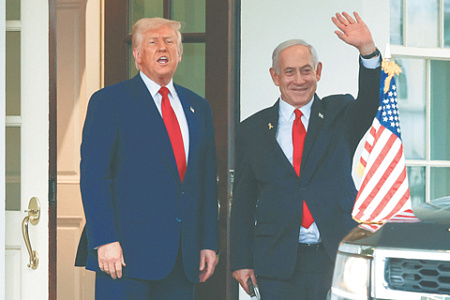
A sudden and dramatic intervention by Donald Trump in Israeli domestic affairs has sent shockwaves through the US-Israel relationship. In a move widely seen as an unprecedented interference in the judicial system of a sovereign ally, the American president has publicly vowed to “save” Israeli Prime Minister Benjamin Netanyahu from his ongoing corruption trial, which Trump has decried as a “witch hunt.” The declaration has fueled accusations of political meddling and sparked speculation about a high-stakes diplomatic deal.
For five years, Prime Minister Netanyahu has been embroiled in a series of legal battles, known in Israel as Cases 1000, 2000, and 4000. The proceedings, which accuse him of bribery, fraud, and breach of public trust, have persisted through multiple elections, regional conflicts, and changes in government. The charges are severe, and a conviction on all counts could potentially result in a prison sentence that would see the veteran leader spend the rest of his life behind bars. Despite the immense political and public pressure, Netanyahu has steadfastly refused to step down.
Trump’s intervention came via a fiery post on his Truth Social platform. He hailed Netanyahu as a “great hero” and credited him with the unconfirmed feat of destroying Iran’s nuclear program. “The trial of Bibi Netanyahu must be ENDED IMMEDIATELY, or he must be pardoned,” Trump wrote, concluding with a bold assertion: “The United States of America saved Israel, and now the United States of America will save Bibi Netanyahu.” The Israeli Prime Minister quickly responded with gratitude, thanking Trump for his “touching support.”
However, the move was met with swift condemnation from the Israeli opposition. Yair Lapid, a leading opposition figure, stated bluntly, “With all due respect and appreciation for the US president, he must not interfere in the legal process of an independent state.” Trump’s promise raised immediate questions about its feasibility, as a US president has no legal authority to pardon or halt a trial in another democratic country with an independent judiciary.
This has led to intense speculation within the Israeli press that Trump’s statement is a signal of his trademark “art of the deal” diplomacy. Observers suggest a potential quid pro quo is on the table: the White House could leverage its influence to secure a pardon for Netanyahu, perhaps through a plea deal previously floated by Israeli President Isaac Herzog. In return, Netanyahu would be expected to adhere strictly to a US-brokered truce with Iran and adopt a more conciliatory stance in negotiations with Hamas, thereby securing a foreign policy victory for Trump.
Analysts, however, caution against a simple interpretation. Lyudmila Samarskaya, a researcher at the IMEMO RAS Center for Middle East Studies, suggests that while a deal cannot be ruled out, Trump’s words are likely aimed at providing political and ideological support to a key ally. The statement reflects a shared worldview between the two leaders, both of whom have publicly railed against what they perceive as an overly powerful and politically motivated judiciary in their respective countries. Netanyahu’s own attempts to push through a controversial judicial reform were met with massive protests, while Trump has frequently clashed with US courts. In this light, Trump’s outburst may be as much an expression of personal frustration with the judicial system as it is a calculated diplomatic maneuver.
